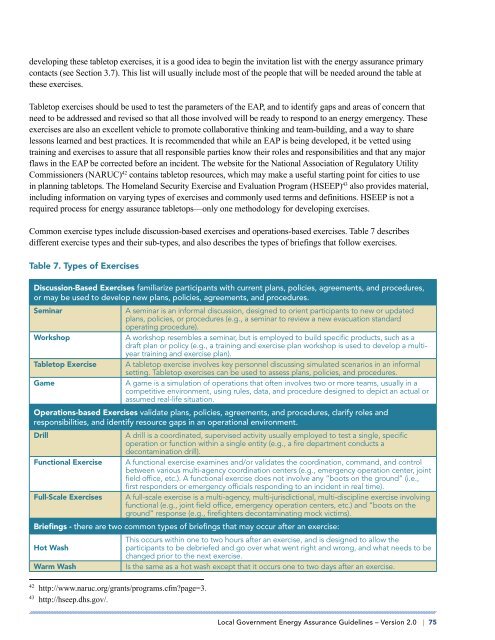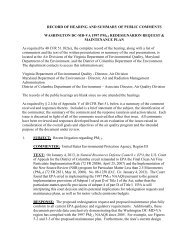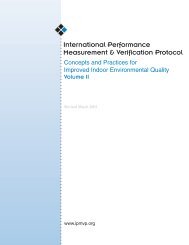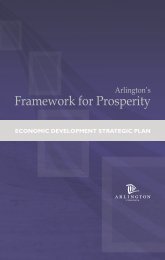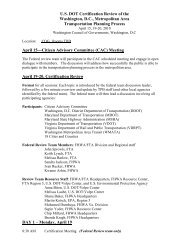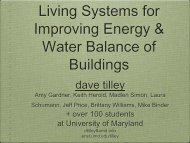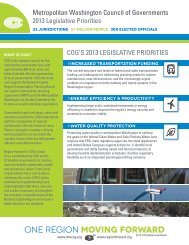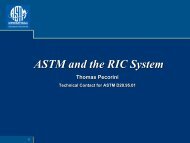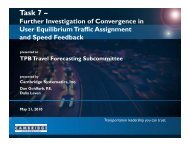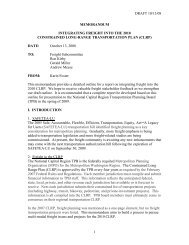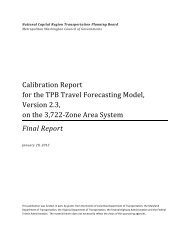PTI Local Government Energy Assurance Guidelines - Metropolitan ...
PTI Local Government Energy Assurance Guidelines - Metropolitan ...
PTI Local Government Energy Assurance Guidelines - Metropolitan ...
Create successful ePaper yourself
Turn your PDF publications into a flip-book with our unique Google optimized e-Paper software.
developing these tabletop exercises, it is a good idea to begin the invitation list with the energy assurance primary<br />
contacts (see Section 3.7). This list will usually include most of the people that will be needed around the table at<br />
these exercises.<br />
Tabletop exercises should be used to test the parameters of the EAP, and to identify gaps and areas of concern that<br />
need to be addressed and revised so that all those involved will be ready to respond to an energy emergency. These<br />
exercises are also an excellent vehicle to promote collaborative thinking and team-building, and a way to share<br />
lessons learned and best practices. It is recommended that while an EAP is being developed, it be vetted using<br />
training and exercises to assure that all responsible parties know their roles and responsibilities and that any major<br />
flaws in the EAP be corrected before an incident. The website for the National Association of Regulatory Utility<br />
Commissioners (NARUC) 42 contains tabletop resources, which may make a useful starting point for cities to use<br />
in planning tabletops. The Homeland Security Exercise and Evaluation Program (HSEEP) 43 also provides material,<br />
including information on varying types of exercises and commonly used terms and definitions. HSEEP is not a<br />
required process for energy assurance tabletops—only one methodology for developing exercises.<br />
Common exercise types include discussion-based exercises and operations-based exercises. Table 7 describes<br />
different exercise types and their sub-types, and also describes the types of briefings that follow exercises.<br />
Table 7. Types of Exercises<br />
Discussion-Based Exercises familiarize participants with current plans, policies, agreements, and procedures,<br />
or may be used to develop new plans, policies, agreements, and procedures.<br />
Seminar<br />
A seminar is an informal discussion, designed to orient participants to new or updated<br />
plans, policies, or procedures (e.g., a seminar to review a new evacuation standard<br />
operating procedure).<br />
Workshop<br />
A workshop resembles a seminar, but is employed to build specific products, such as a<br />
draft plan or policy (e.g., a training and exercise plan workshop is used to develop a multiyear<br />
training and exercise plan).<br />
Tabletop Exercise A tabletop exercise involves key personnel discussing simulated scenarios in an informal<br />
setting. Tabletop exercises can be used to assess plans, policies, and procedures.<br />
Game<br />
A game is a simulation of operations that often involves two or more teams, usually in a<br />
competitive environment, using rules, data, and procedure designed to depict an actual or<br />
assumed real-life situation.<br />
Operations-based Exercises validate plans, policies, agreements, and procedures, clarify roles and<br />
responsibilities, and identify resource gaps in an operational environment.<br />
Drill<br />
A drill is a coordinated, supervised activity usually employed to test a single, specific<br />
operation or function within a single entity (e.g., a fire department conducts a<br />
decontamination drill).<br />
Functional Exercise A functional exercise examines and/or validates the coordination, command, and control<br />
between various multi-agency coordination centers (e.g., emergency operation center, joint<br />
field office, etc.). A functional exercise does not involve any “boots on the ground” (i.e.,<br />
first responders or emergency officials responding to an incident in real time).<br />
Full-Scale Exercises A full-scale exercise is a multi-agency, multi-jurisdictional, multi-discipline exercise involving<br />
functional (e.g., joint field office, emergency operation centers, etc.) and “boots on the<br />
ground” response (e.g., firefighters decontaminating mock victims).<br />
Briefings - there are two common types of briefings that may occur after an exercise:<br />
Hot Wash<br />
Warm Wash<br />
42<br />
http://www.naruc.org/grants/programs.cfm?page=3.<br />
43<br />
http://hseep.dhs.gov/.<br />
This occurs within one to two hours after an exercise, and is designed to allow the<br />
participants to be debriefed and go over what went right and wrong, and what needs to be<br />
changed prior to the next exercise.<br />
Is the same as a hot wash except that it occurs one to two days after an exercise.<br />
<strong>Local</strong> <strong>Government</strong> <strong>Energy</strong> <strong>Assurance</strong> <strong>Guidelines</strong> – Version 2.0 | 75


